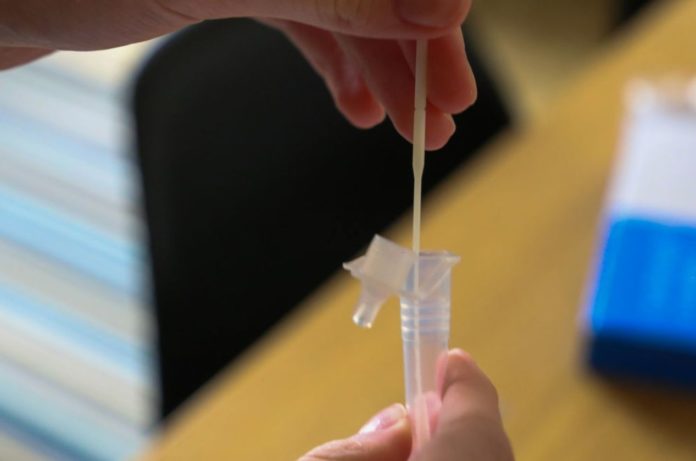The findings put doubt on the efficacy of the COVID-19 lateral flow tests, which are widely used in schools.
A review, published in BMJ, shows that some popularly used rapid antigen tests are not reliable enough to meet the WHO guidelines.
The performance of lateral flow (antigen) tests frequently used to detect COVID-19 infection in children falls short of the minimum criteria established by the World Health Organization (WHO) and US and UK device regulators, according to a pooled data analysis of available evidence on eight different tests published in the journal BMJ Evidence-Based Medicine.
In light of these results, academics question the efficacy of their extensive use of in-school testing.
In schools and kindergartens, lateral flow (antigen) tests have been frequently used to detect children infected with SARS-CoV-2, the virus that causes COVID-19 infection.
The accuracy of these tests in adults is exceedingly variable, and typically falls far short of what manufacturers claim. However, it is unclear how well they perform in real-life situations with children.
To close this knowledge gap, the researchers combed through research databases and pre-print servers for reports reported between 2020 and May 2021 that assessed the accuracy of lateral flow antigen tests with swab (PCR) tests, considered the gold standard, in children.
They found 17 articles in English that were relevant (12 peer-reviewed journal studies and 5 pre-print studies). There were 6355 children involved, using eight antigen testing from six different brands.
In 11 of the test evaluations, samples were taken from both the throat and the nose; in the others, only the nose was sampled. The sample collection in one study was supervised, while the sample collection in the others was done by trained personnel.
The diagnostic sensitivity and specificity of these tests were calculated using data from all 17 investigations. Sensitivity refers to how well a test detects those who have an illness or infection, while specificity refers to how well it detects those who don’t.
The overall sensitivity of the tested procedures was just over 64%, while the overall specificity was just over 98%. The study was then narrowed down to children with and without symptoms.
Based on 3413 children in 13 trials, the pooled diagnosis sensitivity was just under 72% and the pooled diagnostic specificity was just under 98% among children reporting symptoms.
Based on 2439 children in ten trials, the pooled diagnosis sensitivity was just over 56% and the pooled diagnostic specificity was just over 98.5% among children without symptoms.
According to the researchers, these observed disparities in test performance across children with and without symptoms demonstrate that sensitivity and specificity are not inherent test properties.
They point out some of the limitations of their findings. The majority of the studies were unable to be evaluated for quality due to insufficient reporting. The review was also limited to only 8 tests, despite the fact that there are over 500 lateral flow tests for professional users on the market.
None of the studies looked at unskilled people collecting samples or self-testing, both of which are expected to degrade performance. The findings may not apply to future SARS-CoV-2 variants or children who have been immunized, the researchers note.
“Sensitivity estimates of antigen tests varied broadly among studies and were substantially lower than reported by manufacturers,” they add, despite the fact that most tests are intended only for people with symptoms, and performance data reported by manufacturers usually refer only to those with symptoms.
“Less variation and only minor discrepancies to performance claims by manufacturers were observed for specificity estimates across studies.”
But they conclude: “Taking into account test-specific pooled results, no test included in this review fully satisfied the minimum performance requirements as recommended by WHO…, the US [Food and Drug Administration…or the Medicines and Healthcare products Regulatory Agency (MHRA) in the UK.
“This may affect the planned purpose of the broad implementation of testing programmes.”
While lateral flow tests supplement PCR tests, increase test capacity, and are useful when a quick turnaround is required, they nevertheless “come at the price of lower diagnostic accuracy, most notably a lower diagnostic sensitivity, which increases the risk of missing cases, including those with pre-symptomatic infection who have yet to enter the most infectious period,” they write.
They note that whether this may be compensated for by regular testing is a moot point.
Source: 10.1136/bmjebm-2021-111828
Image Credit: Getty
You were reading: Some commonly used rapid antigen tests may not be accurate enough in schools
